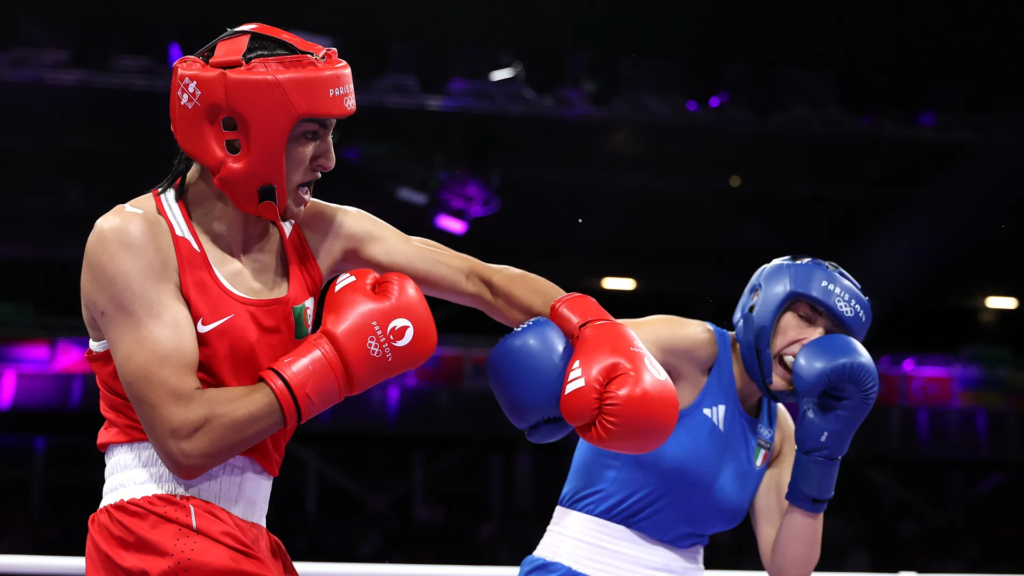US Olympic officials have made a powerful and controversial decision by officially banning biological men who identify as women from competing in women’s categories at all Olympic-level events under their jurisdiction. This announcement has sparked intense national debate, as the country balances the ongoing push for gender inclusion with rising concerns about fairness and integrity in women’s sports.
This move brings the US Olympic & Paralympic Committee (USOPC) in line with similar policies set by global sports authorities in recent years. While supporters say the policy protects the competitive standards of women’s sports, critics argue it could roll back years of progress for transgender athletes.
The ruling takes effect immediately and will apply to all national Olympic trials and competitions leading up to the 2028 Los Angeles Olympics.
Impact on Athletes Under New US Olympic Rules

Under the new policy, athletes born male, regardless of current gender identity or hormone status, will not be allowed to compete in female-only events. The committee said the decision was based on extensive medical research, athlete feedback, and global standards.
This means transgender women individuals who were assigned male at birth but now identify and live as women cannot enter women’s divisions in events like track and field, swimming, wrestling, and other gender-separated sports.
Athletes who do not qualify under the new criteria will still be eligible to compete in men’s divisions, where participation is not restricted based on biological sex or gender identity.
Why This Change Was Made
The USOPC explained that the change was introduced to ensure fairness, safety, and competitive balance in women’s events. Concerns have grown among athletes, coaches, and sports scientists that individuals who have experienced male puberty may retain physical advantages such as increased muscle mass, bone density, and oxygen capacity even after hormone therapy.
These traits, according to the committee, could create an uneven playing field in women’s competitions, especially in strength, endurance, and contact sports.
The decision follows growing pressure from national sports organizations, Olympians, and the public who argued that allowing biological men in women’s sports compromised female athletes’ opportunities, rankings, and records.
Background: Growing Debate in Sports Policy
The USOPC’s move follows a global trend. In recent years, several international governing bodies have placed restrictions on transgender women competing in female divisions. In 2022, World Aquatics barred transgender athletes who experienced male puberty from participating in women’s competitions. World Athletics, the global body for track and field, adopted a similar rule in 2023.
The International Olympic Committee (IOC) previously allowed transgender women to compete under strict testosterone level regulations, but left enforcement and interpretation to each country and sport. The USOPC’s new policy now establishes a clear nationwide stance, setting a precedent for national federations and youth organizations across the United States.
Impact on Athletes and Sports Programs
This policy will directly affect athletes training for the Olympic Games. Transgender women who had previously competed or planned to compete in women’s categories will now have to either switch to the men’s division or explore other competitive platforms.
The decision also affects college and high school athletes, particularly those competing in Olympic sports like gymnastics, track and field, swimming, and wrestling. Many of these athletes participate in both school-level and Olympic development programs, which will now face stricter eligibility rules.
Some athletes and advocacy groups have already announced plans to challenge the policy in court, arguing that it violates civil rights and could lead to further exclusion of transgender individuals from elite sports.
Reactions from the Sports Community

The sports world has responded with a mix of support and criticism.
- Supporters, including several female Olympians and sports officials, say the ban is a long-overdue correction that protects fairness and recognizes the importance of biological sex in sports outcomes.
- Critics, especially LGBTQ+ advocacy groups, say the move sends a harmful message to transgender athletes and may discourage participation and inclusion at all levels of sport.
While the debate continues, one thing is clear: this policy will reshape the competitive landscape in U.S. Olympic sports for years to come.
Legal and Political Implications
The decision could lead to legal challenges, particularly on the basis of Title IX, which bans sex-based discrimination in federally funded programs, including athletics. Although Title IX does not explicitly mention gender identity, courts and agencies have increasingly interpreted it to include transgender protections.
Now, with a national Olympic ban on transgender women in women’s sports, lawsuits are expected to test the boundaries between biological sex, gender identity, and sports eligibility in court.
Additionally, this decision may influence ongoing political discussions, especially in states that have already passed laws limiting transgender participation in school sports. It could also play a role in the upcoming presidential election, as candidates take positions on sports, gender rights, and civil liberties.
Public Opinion: A Divided Nation
Polls suggest that American public opinion remains divided on the issue of transgender participation in women’s sports. While a majority supports transgender rights in general, many also support separating sports by biological sex in the interest of fair competition.
This division is reflected across social media, political groups, and sports fans. Some praise the USOPC for taking a firm stand on fairness, while others see it as a setback for inclusion and acceptance.
With the 2028 Olympics approaching in Los Angeles, public attention is likely to intensify. Both supporters and opponents will continue advocating for what they believe is right for sports, for fairness, and for the future of inclusivity.
What’s Next for Transgender Athletes?
Although barred from women’s Olympic categories, transgender athletes still have options:
- Compete in men’s divisions, where rules are currently less restrictive.
- Participate in non-Olympic leagues or inclusive sports events that welcome all gender identities.
- Advocate for the creation of open or mixed-gender categories, which some organizations have begun exploring.

Many in the LGBTQ+ community are also calling for expanded dialogue, more inclusive policies, and science-backed discussions that consider both performance and identity.
Conclusion: A Defining Moment in Sports History
The US Olympic Committee’s decision to ban biological men who identify as women from competing in women’s sports is a landmark moment that will have far-reaching effects on the future of athletics in the United States.
Supporters hail it as a bold move to protect fairness in competition. Critics argue it’s a painful step backward for transgender rights. Regardless of which side one falls on, there is no denying that this decision has launched a national conversation that won’t fade away anytime soon.
As sports evolve to reflect broader social changes, finding the balance between inclusion and competition remains one of the greatest challenges of our time.
Read more – JD.com Ceconomy Acquisition: Chinese E-Commerce Giant Eyes $2.6B Deal






